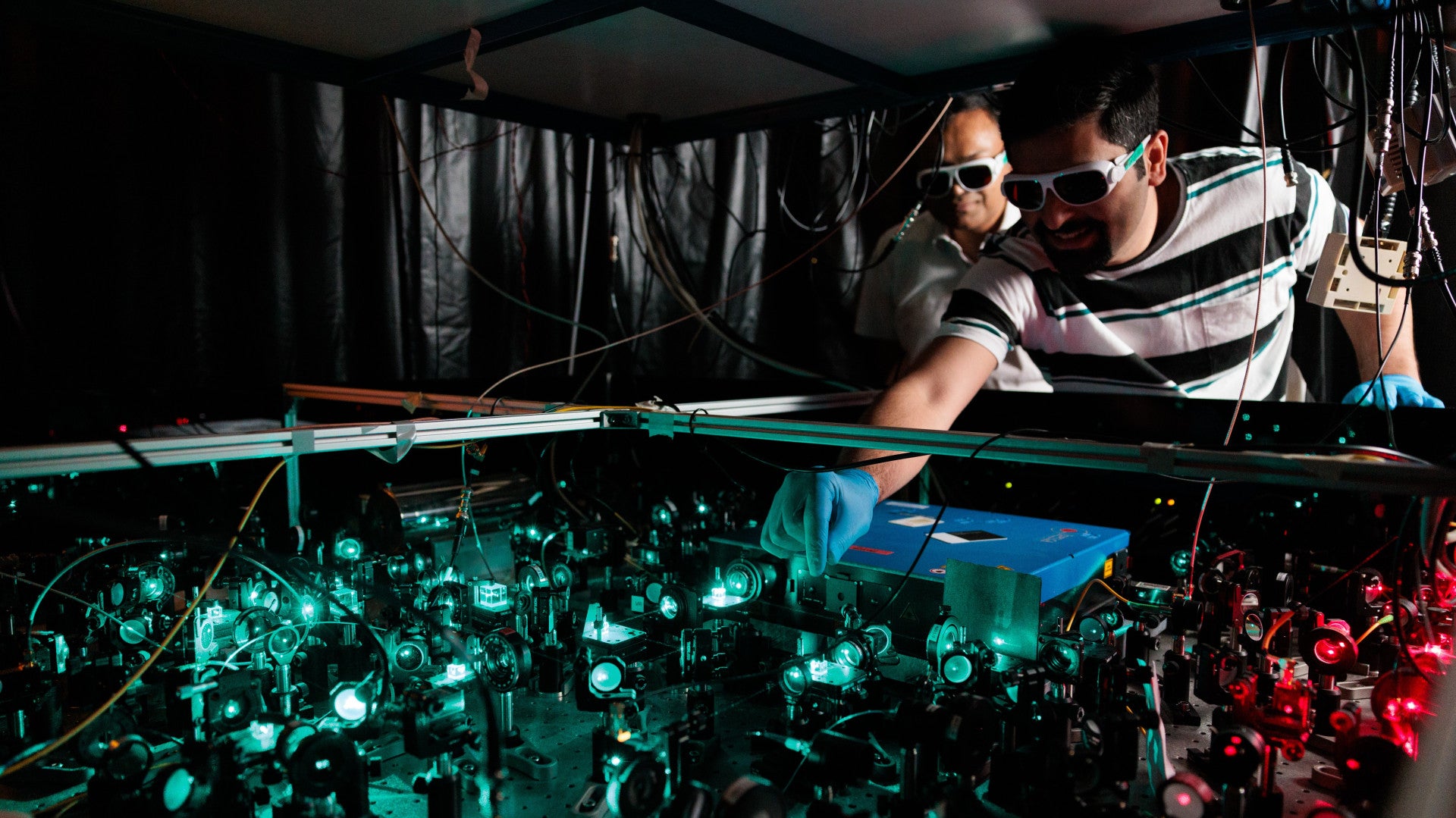A strong boost for quantum research and innovation at NUS
June 05, 2024
Quantum scientists from the Centre for Quantum Technologies at NUS will be taking the lead in strengthening basic research and accelerating innovations to build a quantum industry in Singapore.
Cutting-edge research in quantum technologies at NUS gets a shot in the arm with the elevation of the Centre of Quantum Technologies (CQT), a Research Centre of Excellence hosted by NUS, into a flagship national research centre. This is part of Singapore’s new National Quantum Strategy (NQS) to strengthen our position as a leading hub in the development and deployment of quantum technologies.
Over the next five years, close to S$300 million will be invested in four initiatives under the NQS: CQT; the Quantum Engineering Programme 3.0 (QEP 3.0); the National Quantum Processor Initiative (NQPI); and the National Quantum Scholarship Scheme (NQSS). Through these initiatives, the NQS aims to build a vibrant quantum ecosystem in Singapore where industry and research coincide with a talented workforce, while ensuring assured access to critical quantum technologies of national importance.
Deputy Prime Minister and Chairman of the National Research Foundation (NRF) Mr Heng Swee Keat announced the launch of the NQS in his opening address at the opening ceremony of Asia Tech x Summit (ATxSummit), which was held on 30 May 2024.
The NQS is supported by the NRF and driven by the National Quantum Office (NQO) hosted by the Agency for Science, Technology and Research (A*STAR). The NQO will serve as the Programme Office to manage and coordinate quantum research, innovation, and enterprise activities in Singapore.
During his opening address, DPM Heng noted that the seeds of this strategy was planted almost 20 years ago, when CQT was established at NUS. “Today, CQT is regarded as a premier institution globally for quantum science and technology,” he noted.
DPM Heng further outlined the four key thrusts of the NQS – namely scientific excellence, engineering capabilities, talent, and innovative enterprises – which will “form an integrated approach in building a quantum ecosystem” in Singapore.
Fostering scientific excellence in quantum technologies
One of the four key thrusts of the NQS focuses on strengthening scientific excellence in high impact areas of quantum research, including quantum communications and security, quantum processors and quantum sensing.
Under the NQS, CQT will be elevated to a flagship national R&D centre for quantum technologies to coordinate research talent across the country. NUS will remain the Centre’s host institution, with nodes at A*STAR and other universities in Singapore to encourage research excellence and enable investigator-led research that is aligned with Singapore’s Research, Innovation and Enterprise 2025 plan.
As a national centre, CQT will focus on research in basic science, quantum communication and cryptography, quantum processors and computing, and quantum sensing. Scientists at CQT will conduct groundbreaking research aimed at controlling large quantum systems, developing quantum internet technologies, enhancing quantum computing platforms, and advancing quantum sensing in areas such as gravimetry in the study of geodynamics and atomic clocks used in GPS and communications systems.
Research carried out at CQT will also support other NQS initiatives, such as the NQPI and the QEP, to accelerate the translation of quantum research into real-world applications.
Beyond scientific research, CQT will dedicate its resources to training scientists and engineers undertaking PhD and Master-level degrees to grow Singapore’s talent pool to drive quantum research and Singapore’s quantum technologies ecosystem.
Elaborating on the crucial role of CQT, DPM Heng highlighted that the elevation of CQT to a national centre will “provide a foundation of scientific expertise for our quantum ecosystem.”
“Singapore has made a strong start in quantum technologies, and the National Quantum Strategy is a bold move to build on the momentum. I welcome that it supports the full breadth of research from scientific excellence to engineering. At the Centre for Quantum Technologies, we will spark ideas and foster talent. In the national-level quantum programmes, we will work with companies in fields from finance to biotech. Students taking up the new National Quantum Scholarships will be entering a fast-advancing field with many career paths,” said Professor José Ignacio Latorre who is the Director for CQT and a faculty member of the Department of Physics under the NUS Faculty of Science.
Prof Latorre is also Lead Principal Investigator of the National Quantum Computing Hub (NQCH) – a national-level programme for developing quantum computing capabilities and exploring applications through industry collaborations – and he will also drive the new NQPI.
Developing quantum capabilities and driving commercialisation
In addition to advancing scientific excellence, the NQS seeks to strengthen Singapore’s engineering capabilities in quantum technologies to boost the application of quantum research for real-world solutions. This will be achieved through two newly established initiatives – the National Quantum Sensor Programme (NQSP) under QEP 3.0 and the NQPI – and the existing National Quantum Federated Foundry.
NQS will also attract, develop, and retain talent to support quantum research and commercialisation. The new NQSS aims to nurture a pipeline of up to 100 PhD and 100 Master-level talent over the next five years to meet industry and research needs as well as build a quantum-ready workforce that can tap on the potential of quantum technologies.
Furthermore, NQS will focus on building a vibrant and resilient quantum industry through national-level quantum programmes that will drive industry partnerships, including nurturing start-ups in quantum technologies.
The national-level programmes will continue to be led by researchers from CQT. The National Quantum Safe Network is led by Associate Professor Alexander Ling, and the National Quantum Federated Foundry is led by Research Associate Professor Manas Mukherjee.
To complement these programmes, the NQO will also launch thematic grant calls focusing on three main application areas – quantum communications and security, quantum processors, computation and simulation, and quantum sensing and metrology.
Source: NUS News


